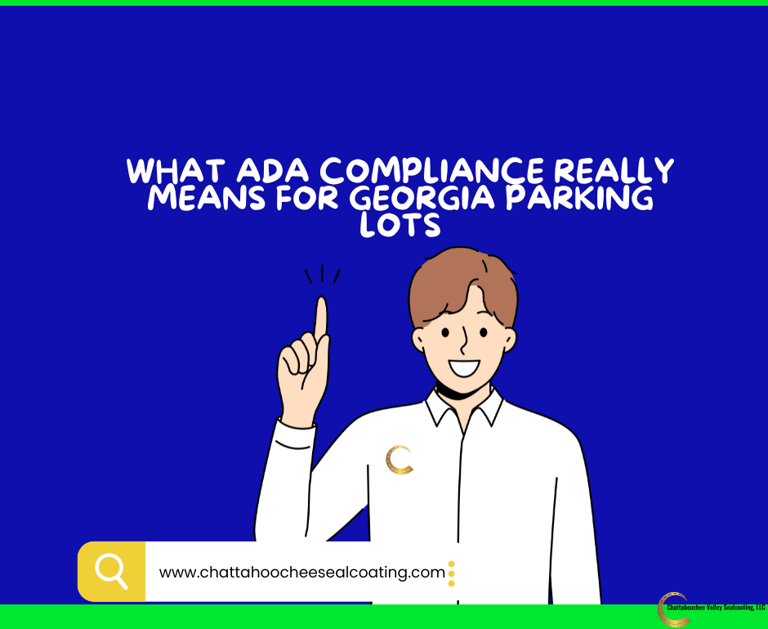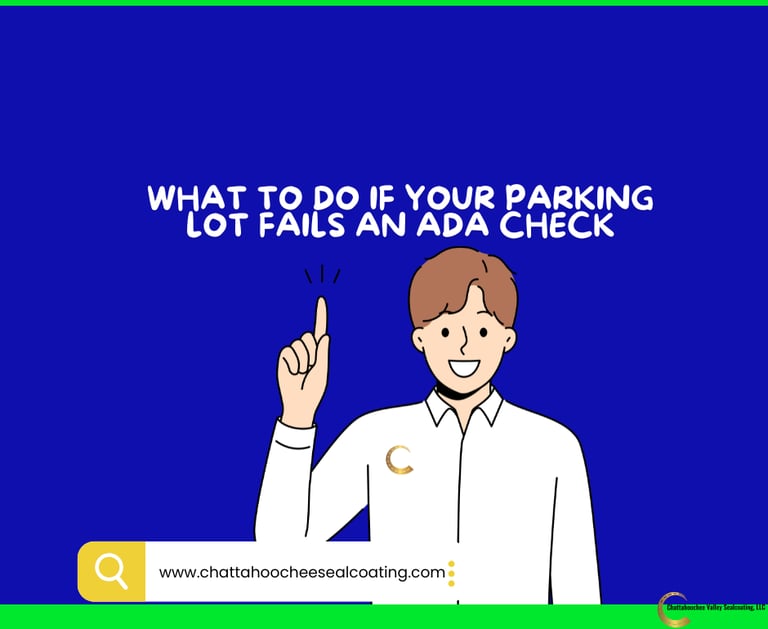Georgia Businesses: Is Your Parking Lot ADA Compliant?
When it comes to first impressions, your parking lot speaks volumes—and it could be putting your business at risk. ADA compliance is more than a legal requirement; it's a signal that your property is safe, inclusive, and accessible for everyone. Yet many business owners overlook the details that make a parking lot compliant, leaving them vulnerable to fines, lawsuits, or public criticism. Whether you own a retail storefront, manage a professional office, oversee a school or church, or run a multi-unit commercial property, understanding ADA standards is essential. In this guide, we’ll break down the fundamentals of ADA compliance for parking lots and help you determine whether your property meets current guidelines. We’ve organized this article into five clear sections. Let’s start with the basics.
Chattahoochee Valley Sealcoating
12 min read
What ADA Compliance Really Means for Georgia Parking Lots
ADA compliance isn’t just about legal checkboxes—it’s about ensuring your property is accessible and welcoming to all customers. For businesses across Georgia, that responsibility starts the moment someone pulls into the parking lot. Under federal law, accessible parking spaces must be properly marked, dimensioned, and placed in a way that allows individuals with disabilities to safely exit their vehicles and reach your entrance without barriers. Even a single missing sign or poorly sloped surface could mean your lot is non-compliant. And in today’s business climate, accessibility isn’t just about law—it’s about leadership and inclusion.



Why Parking Lots Are the Most Overlooked ADA Violation Hotspots
It’s surprisingly common for Georgia businesses to focus on interior accessibility—automatic doors, ramps, or bathrooms—while completely overlooking the lot outside. But parking areas are where most ADA citations start. Over time, painted lines fade, signs fall or get damaged, and minor repairs go unaddressed. Even newer properties can fail inspections if their slope, spacing, or layout doesn't meet current code. That’s because ADA regulations can change, and what passed five years ago may no longer be up to standard. Property managers and owners should view their parking lots as dynamic, not static, parts of the accessibility equation.
The Legal and Financial Risks of ADA Non-Compliance in Georgia
Failing to comply with ADA parking requirements can carry heavy legal and financial consequences in Georgia. Enforcement isn’t limited to government inspectors—private individuals, legal firms, and advocacy groups often initiate lawsuits over non-compliant lots. These cases rarely end with a warning. Instead, you could face thousands of dollars in fines, mandatory upgrades, and attorney fees—even if the issue seems minor. In some instances, it takes just one person filing a complaint to trigger a full property audit. That’s why routine compliance checks are essential—not only to avoid penalties but to protect your brand and bottom line.
The Specific Requirements Every Accessible Parking Space Must Meet
To be considered ADA-compliant in Georgia, each accessible parking space must follow strict federal design criteria. These aren’t general suggestions—they’re measured specifications enforced by both state and federal agencies.
Key requirements include:
A standard accessible space must be at least 8 feet wide with a 5-foot access aisle
A van-accessible space must be 11 feet wide with an 8-foot access aisle
Signs must display the International Symbol of Accessibility and be mounted at least 60 inches high
Slopes in the space and aisle cannot exceed 1:48
The surface must be stable, firm, and slip-resistant
These details might seem technical, but they’re non-negotiable—and violations often stem from simple wear and tear or improper striping techniques.
Who Is Legally Responsible for ADA Compliance in Shared or Leased Lots?
A common misconception among Georgia business owners is that landlords are automatically responsible for ADA compliance in shared or leased properties. In reality, the law often holds whoever operates the business accountable for ensuring that publicly accessible areas—like parking lots—are compliant. This means that even if you're leasing space in a shopping center or office park, you may still be liable if the lot outside your front door fails to meet ADA standards. The best approach is proactive: review your lease agreement, clarify responsibilities in writing, and schedule regular compliance assessments. Because when an issue arises, pointing fingers won’t protect you from liability.
How to Tell If Your Parking Lot Is Currently ADA Compliant
Many Georgia property owners assume their lot is compliant simply because it “looks fine” or was approved years ago. But ADA standards evolve, and so does your pavement. Striping can fade, pavement can crack, slopes can shift, and signage can get damaged or outdated. A lot that once passed inspection may now violate multiple accessibility rules without you even realizing it. The only way to know for sure is to perform a detailed assessment or schedule a professional ADA compliance inspection.
The First Things to Check During a DIY Compliance Walkthrough
While a full audit is best left to professionals, there are some basic things any Georgia business owner can check right away. Start by counting your total parking spaces and verifying that you have the correct number of accessible stalls. Next, measure the width of each space and aisle. Look for clear, bright striping, standing signs (not just paint), and obvious access paths to your front entrance.
One quick visual checklist includes:
Are your accessible spaces still visibly marked and labeled?
Are the signs posted at least 60 inches high and easy to read?
Do your van-accessible spaces have 8-foot aisles?
Is the pavement level and crack-free in those areas?
Common ADA Mistakes That Could Be Costing Georgia Businesses
Even the most well-intentioned property owners often miss small compliance details that lead to big problems. One of the most common issues is improper signage—either missing entirely or mounted too low. Another is surface slope. ADA requires an almost perfectly flat surface for accessible spaces and aisles, but few property owners know how to measure that. Other frequent oversights include access aisles that don’t connect directly to the building entrance or parking spaces placed too far away from accessible doors.
Why Compliance Isn't Just About Your Parking Spaces
Many Georgia businesses assume that ADA compliance stops at the space itself, but it’s just the beginning. The access aisle must lead to a clearly defined path that reaches your entrance without barriers. That means ramps must be present where curbs exist, surfaces must be smooth, and the walking path can’t dip, slope, or be obstructed by landscaping or signage poles. In short, accessibility starts in the lot but continues all the way to the building entrance—and every part of that journey must meet ADA standards.
When to Bring in a Professional for a Compliance Assessment
If you're unsure whether your Georgia parking lot meets ADA requirements, don’t wait for a complaint to find out. A professional inspection can identify issues you’d likely miss and provide a detailed plan for corrections. These assessments can include slope measurements, layout analysis, proper signage checks, and recommendations for cost-effective upgrades. Bringing in a qualified professional before an issue arises isn’t just smart—it’s often cheaper than waiting until you’re forced to fix it under legal pressure.
What to Do If Your Parking Lot Fails an ADA Check
If you've recently discovered that your parking lot isn’t ADA compliant, don’t panic—but don’t delay. The first step is identifying all the specific violations, from faded paint to slope issues or missing signs. Once those are listed, you can prioritize the fixes based on risk and urgency. In Georgia, many businesses choose to phase repairs in stages—starting with striping and signage, then addressing structural grading or resurfacing. The important thing is showing a clear effort toward compliance, which can reduce legal exposure if an issue is ever challenged.



How to Choose the Right Contractor for ADA Parking Lot Upgrades
Not all paving contractors are created equal when it comes to ADA work. In Georgia, you'll want to hire a contractor who understands the federal regulations and how they intersect with local code enforcement. Look for someone who offers striping, signage installation, slope correction, and layout planning in one package. Ask for photos of past ADA upgrade projects, and make sure they use precise measuring equipment—not just tape measures and guesswork. The quality of the work matters just as much as the intention behind it.
Why Striping Alone Won’t Make You ADA Compliant
It’s a common myth in the Georgia paving world that simply repainting the lines is enough to “fix” a non-compliant lot. While fresh striping helps, it won’t correct issues with slope, signage height, aisle width, or curb access. In fact, striping over non-compliant dimensions can make things worse—giving the appearance of accessibility while still violating the law. That’s why a full evaluation and measured layout plan should come before the paint is even opened.
Budgeting for ADA Repairs Without Breaking the Bank
Many Georgia business owners worry that bringing their parking lot into compliance will cost a fortune—but that’s not always the case. While major slope corrections or concrete work can be expensive, many ADA issues are low-cost fixes. Replacing signs, restriping stalls, or adding a curb ramp can often be done affordably, especially when bundled with regular maintenance.
Here are a few budget-friendly fixes that can make a big impact:
Replacing or raising existing signs
Re-striping access aisles to correct width
Adding compliant van-accessible spaces
Grinding down minor slopes
Installing prefabricated curb ramps where needed
The Importance of Documentation and Proof of Compliance
Once your ADA repairs are complete, it’s important to keep detailed records. In Georgia, this documentation can serve as your first line of defense if a complaint is ever filed. Keep before-and-after photos, invoices, inspection notes, and layout plans on file. This not only shows that you took action—it can also demonstrate that your business is acting in good faith, which may reduce liability or penalties. ADA compliance isn’t a “set it and forget it” task—it’s an ongoing responsibility, and records prove you’re treating it as such.
Why ADA Compliance Is an Ongoing Obligation, Not a One-Time Fix
ADA standards don’t just apply when you first open your business—they’re a long-term requirement. Weather, time, and traffic wear down compliant features like paint, signage, and surface level. In Georgia’s climate, frequent rain and heat cycles can accelerate deterioration, especially in high-traffic lots. That’s why maintaining compliance means committing to regular check-ins, not just one upgrade. What passes inspection today might be out of spec by next year if it’s not maintained properly.
How Routine Sealcoating Helps Preserve ADA Markings and Surfaces
Sealcoating does more than protect your asphalt—it helps extend the life of your ADA striping and signage zones. In Georgia, where UV rays and moisture wear down pavement fast, sealcoating every 2–3 years can help prevent fading, cracking, and surface erosion. This ensures that your accessible spaces remain clearly visible and easy to navigate. A fresh coat of sealer also provides a clean surface for restriping, which is essential for keeping access aisles and stall dimensions intact over time.
Scheduling Annual ADA Walkthroughs as Part of Lot Maintenance
The best way to stay ahead of violations is by including ADA assessments in your annual parking lot maintenance routine. A simple yearly walkthrough can catch issues early—before they become a problem. Many Georgia businesses include this in their spring or fall maintenance schedules, pairing it with sweeping, sealing, and minor repairs. Whether you self-inspect or hire a professional, consistency is key. ADA compliance should be part of your preventive strategy, not an emergency reaction.
The Role of Your Facility or Property Manager in ADA Upkeep
If you manage a commercial property in Georgia or oversee multiple business locations, ADA compliance should be part of your facility manager’s checklist. The person responsible for exterior maintenance should know what to look for and be empowered to report issues as they arise. ADA violations don’t just happen all at once—they creep in slowly. A good maintenance plan includes:
Monthly visual inspections of accessible spaces
Checking sign visibility and height
Ensuring access aisles are free from obstructions
Reporting damage or wear to striping and surfacing
How Staying Proactive Protects Your Business and Builds Trust
Beyond avoiding penalties, maintaining ADA compliance demonstrates your business’s values. Customers notice when your lot is well-marked, accessible, and easy to navigate. It sends the message that you care about all members of the community—not just those without mobility issues. In Georgia, where word-of-mouth and reputation matter, being proactive about accessibility can set your business apart. Compliance is good for legal protection, but it’s even better for trust.
What to Do Right Now if You’re Unsure About Your Lot’s Compliance
If you’re reading this and still unsure whether your parking lot meets ADA standards, the safest move is to get it checked. Ignorance doesn’t protect you from penalties—and ADA violations can happen silently over time. A quick walkthrough or professional inspection can give you clarity. For Georgia business owners, it’s better to catch a $200 striping issue now than deal with a $5,000 lawsuit later. Peace of mind starts with a proactive mindset.


Why Partnering With the Right Asphalt Team Matters
ADA compliance isn’t just about painting lines—it’s about knowing the rules and applying them with precision. That’s why Georgia businesses benefit from working with experienced asphalt maintenance teams that specialize in compliance. A qualified contractor understands slope measurements, signage placement, stall dimensions, and how they all interact with state and federal codes. The right partner won’t just repaint your lot—they’ll help you stay compliant long-term.
How ADA Compliance Supports Your Reputation and Business Growth
When a customer with mobility challenges pulls into your lot and sees clear signage, fresh striping, and smooth access, it creates instant trust. ADA compliance tells the public that your business is thoughtful, professional, and welcoming to all. In today’s world—where online reviews and word-of-mouth drive growth—these details matter. Many Georgia businesses are already using compliance as a competitive advantage. It’s not just the right thing to do—it’s smart business.
Don’t Wait Until There’s a Complaint—Get Ahead of It
ADA issues often only become visible when someone files a complaint or, worse, gets injured. At that point, the damage is already done—both legally and to your brand’s reputation. Being proactive gives you the upper hand. Whether it’s an audit, a restriping job, or a curb ramp installation, small steps today can prevent major problems tomorrow. In Georgia, where enforcement is growing more common, staying ahead is your safest bet.
Ready to Protect Your Business? Here’s Your Next Step
You don’t have to figure it out alone. At Chattahoochee Valley Sealcoating, we help Georgia business owners bring their parking lots up to code—safely, affordably, and without the guesswork. From ADA striping and signage to full asphalt repair, we’ve got your lot covered.
How do I know if my parking lot is ADA compliant in Georgia?
The only way to be 100% sure is through a formal assessment that checks every element of compliance—from stall width and access aisles to signage height, slope, and accessible routes to the building. While a visual check helps, Georgia business owners are strongly encouraged to have a qualified professional inspect their lot. Standards change over time, and even minor noncompliance—like a sign mounted too low—can result in a violation.
What are the minimum ADA requirements for parking lots in Georgia?
The basic federal ADA requirements apply across Georgia and include:
At least one accessible parking space for every 25 total spaces
One van-accessible space for every six accessible spaces
Correct signage with the International Symbol of Accessibility, mounted at least 60 inches high
A minimum width of 8 feet for standard accessible spaces and 11 feet for van spaces
An adjacent access aisle (5 feet for standard, 8 feet for vans)
A slope not exceeding 1:48 in any direction
These must be clearly marked, unobstructed, and connected to a safe path leading directly to your entrance.
What happens if my Georgia business is found to be non-compliant?
If your parking lot doesn’t meet ADA requirements, you could face:
Fines of up to $75,000 for the first offense, and $150,000 for subsequent violations
Lawsuits from individuals or disability advocacy groups
Required upgrades under strict timelines
Damage to your reputation and loss of customer trust
In Georgia, enforcement can come from federal agencies or private citizens filing complaints—and violations don’t require someone to be harmed, just that a barrier exists.
Who is responsible for ADA compliance in a leased commercial property?
In most Georgia lease agreements, the business owner or tenant is responsible for areas used by the public—including the parking lot. Even if your landlord handles maintenance, you may still be liable for non-compliance if your customers use that space. That’s why it's essential to review your lease and get clarity on who is expected to maintain and upgrade exterior areas. When in doubt, assume you are responsible until proven otherwise.
How often should I restripe my accessible parking spaces?
In Georgia’s climate—with high heat, rain, and UV exposure—accessible parking spaces should be re-striped every 2–3 years, or sooner if the paint fades or becomes hard to see. If the visibility of lines, access aisles, or ADA symbols begins to deteriorate, you're technically out of compliance—even if everything else is correct. For businesses with higher traffic or older lots, annual reviews are recommended to stay ahead of violations.
Can I get sued even if I didn’t know my lot was non-compliant?
Yes. Under the ADA, lack of awareness is not a valid legal defense. If someone encounters a barrier to access—such as a missing van space or incorrect signage—they can file a lawsuit regardless of your intent. That’s why Georgia businesses must treat ADA compliance as a legal responsibility, not just a courtesy. Proactive maintenance and documentation are your best protection.
What’s the difference between a regular and van-accessible space?
Van-accessible parking spaces are larger and include additional requirements:
Minimum 11-foot width OR 8-foot width with an 8-foot access aisle
Signage that specifically states “Van Accessible”
Clear, unobstructed vertical clearance of at least 98 inches for vans
These stalls are critical for wheelchair users and must be closest to the accessible entrance. Not having one—even if you have regular accessible spaces—puts your Georgia property in violation.
Is my church, school, or nonprofit required to follow ADA parking lot rules?
Yes. If your organization serves the public in Georgia, you're required to provide ADA-accessible parking—even if you're a nonprofit. This applies to churches, schools, community centers, and HOA-managed spaces. The law doesn’t differentiate based on profit status—it’s about access. Religious institutions may be exempt from some ADA Title III rules, but public accommodations like parking lots are generally not excluded.
Does the ADA apply to small parking lots with only a few spaces?
Yes. Even if your lot only has one or two spaces, you’re still required to provide at least one accessible space, and it must be van-accessible. There is no exemption based on business size or square footage. If your business in Georgia offers public parking of any kind, the ADA applies.
What’s the best way to bring my lot into compliance without overspending?
Start with a professional evaluation to identify what’s truly out of spec. In many cases, simple fixes like re-striping, updating signage, or correcting a slope with a minor grind can make a huge difference. Prioritize high-risk issues first—like missing van access or incorrect signage—then phase in more extensive improvements over time. Chattahoochee Valley Sealcoating offers affordable ADA compliance services with expert guidance every step of the way.




